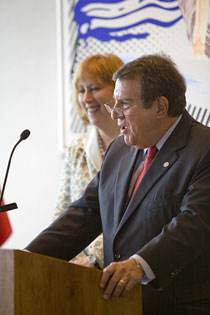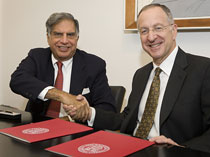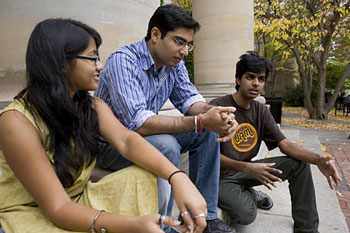WORTH SUPPORTING
Andrew and Ann Tisch commit funding for 'amazing professors'
From elementary school through college, there were teachers who inspired Andrew '71 and Ann Tisch. Now, they have established a $35 million endowment to help Cornell hire its next generation of inspiring professors.
Announced in September, the Tisch University Professorships are meant to help Cornell recruit and retain prolific scholars at the height of their careers. The professorships will not be tied to a specific college or discipline and will be awarded at the provost's discretion.

Ann and Andrew Tisch speak about the importance of education at a luncheon at the Herbert F. Johnson Museum of Art. See larger image
"I have great faith in the leadership of the university," said Andrew Tisch, a Hotel School alumnus. "We didn't want to put so many restrictions on it that the university couldn't operate with free hands."
Competition for top faculty is "ferocious" across higher education, said Interim Provost David Harris. Cornell faces the dual challenges of increasing its capabilities in such highly competitive fields as the life sciences while absorbing the loss of baby boomers, who are beginning to retire in waves.
Faculty recruitment and retention are major priorities of Far Above … The Campaign for Cornell. Of the $4 billion goal, the target for faculty support is $1.885 billion.
"Right now, we're hiring our reputation for the next two to three decades," said G. Peter Lepage, the Harold Tanner Dean of the College of Arts and Sciences, who has seen a quarter of his faculty change in the past five years. "We need all the flexibility we can have."
Meanwhile, schools that face the same challenges as Cornell are aggressively trying to lure away star professors.
"I don't begrudge a great professor for looking at how he or she can conduct research in the best way possible," Tisch said. "What we want to do is make sure that in the end, they conclude that Cornell is the best place to be."
Geoffrey W. Coates, a professor of chemistry and chemical biology whose research has led to advances in biodegradable and sustainable polymers, is nominated to be the first Tisch University Professor.
"It provides the sort of long-term, no-strings funding that will allow me to tackle big problems that I can't ordinarily do with short-term, more restricted funding," Coates said. "It's an opportunity to do the sort of science that I've always dreamed of."
Tisch is co-chairman of the board and chairman of the executive committee of Loews Corp., a company with interests in oil and gas, financial services, watches, real estate and hotels. (The family sold the Loews movie chain in 1985.) He also serves on the Cornell Board of Trustees and its executive committee, as well as on the Harvard Business School Dean's Board of Advisers, and as co-chair of the Dean's Council at the New York University/Tisch School of the Arts.
Ann Tisch, a graduate of Washington University in St. Louis, is president and founder of The Young Women's Leadership Foundation and The Young Women's Leadership School, a groundbreaking inner-city public school for girls that opened in 1996. A number of other schools -- operating under the same model -- have been created since in New York City, Philadelphia, Chicago, Dallas and Austin, Texas. She is also the founder of CollegeBound, a privately funded school-based college counseling service. For 19 years, she worked in broadcast journalism, including as a national correspondent for NBC.
The Tisch family has a long history of support for Cornell, funding scholarships and contributing consistently to the university's Annual Fund. In 2002, Andrew Tisch and brother James S. Tisch '75 established the Andrew H. and James S. Tisch Distinguished University Professorship, the university's highest honor, which is awarded to a faculty member nearing retirement.
Ann Tisch said this new investment will build the foundation for Cornell's future success.
"Every great educational institution is great because of its faculty," she said. "You can't compete at the college and university levels unless you have amazing professors who are going to commit, remain loyal and stay."
$50 million endowment from Tata trust bolsters Cornell ties to India, and to eminent alumnus
With one historic gift, Cornell finds itself with a vast new mandate to fight poverty and malnutrition in India while bringing more of India's best and brightest to study in Ithaca.

Alumnus Ratan Tata and President David Skorton after signing their historic agreement that will provide an endowment of $50 million to Cornell for agriculture and nutrition programs in India and for the education of Indian students at Cornell. See larger image
The Tata Education and Development Trust, a philanthropic arm of India's Tata Group, has given a combined $50 million to endow the new Tata-Cornell Initiative in Agriculture and Nutrition and the Tata Scholarship Fund for Students from India.
President David J. Skorton announced the gift during his State of the University address Oct. 17, calling it "one of the most generous endowments ever received from an international benefactor by an American university."
Ratan Tata '59, B.Arch. '62, is a Cornell trustee and chairman of Tata Sons, the holding company of the Tata Group, one of India's oldest, largest and most respected business conglomerates. Tata was named one of the 30 most respected CEOs in the world by Barron's magazine last year, and the Tata Group was awarded the Carnegie Medal of Philanthropy in 2007.
The $25 million Tata-Cornell Initiative in Agriculture will engage Cornell scientists more deeply with their counterparts in India in efforts to improve the productivity, sustainability and profitability of India's food system, said Alice Pell, Cornell vice provost for international relations.
Changes in the food system -- including record high commodity prices, dietary changes, climate change and soaring energy costs -- can disproportionately affect the poor. The Tata gift will extend numerous successful public-private partnerships Cornell has already established to fight poverty and promote food security in India, and it will permit the development of new ventures, Pell said.

Illika Sahu 12, Manan Suri 09 and Praveen Narayanan 12 sit on the steps of Goldwin Smith Hall. They are three of approximately 400 students from India at Cornell.
"Although the Tata funds will be used to address problems in rural India, the gift will also help us learn how universities can better contribute to development and poverty reduction in other parts of the world," she added.
Meanwhile, the $25 million Tata Scholarship Fund introduces a new era of accessibility for students from India, Skorton said.
"For years, applications for admission from Indian students have continued to rise, but enrollments have remained only steady due, in large part, to the lack of financial aid for needy students," he said. "The Tata Scholarship Fund will support as many as 25 scholars at any given time and will ensure that the very best Indian students have access to Cornell, regardless of their financial means."
Until now, the university's entire endowment for international financial aid generated about $1.5 million per year. That's enough to fund about a dozen new students a year from outside North America, said Doris Davis, Cornell's associate provost for admissions and enrollment.
Davis recalls visiting India a year ago and meeting with prospective students. At the time, she felt the pinch of having little to offer them.
"I met so many bright, talented students who would make such a contribution to Cornell," she said. "Now I can go back and tell the Cornell story with this added information -- not only is Cornell committed to admitting students from India, but now we have the resources to help with their financial needs."